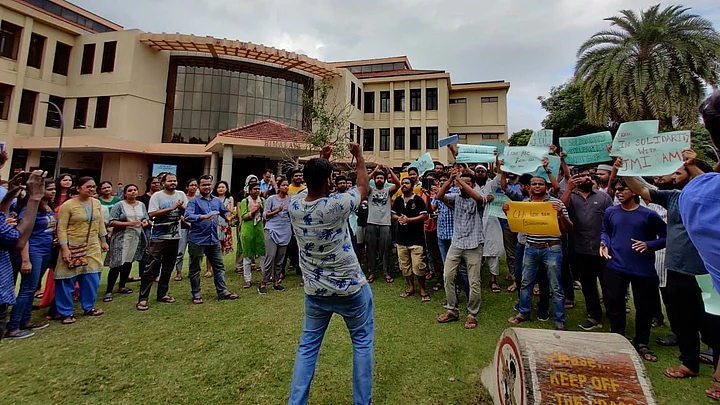A few days ago, a middle-aged man occupying a seat reserved for senior citizens on the Delhi Metro, was watching Amit Shah’s Lok Sabha speech on YouTube, defending the passage of the Citizenship Amendment Bill. Pausing the video abruptly, the man loudly told the man sitting next to him in Hindi: “It seems Amit Shah is finally getting things done! (continuing with a grin on his face).. Muslims across the country now will have no option but to get in line… Accha Hai (It is good)”.
A Muslim man, who appeared to be either going to or returning from his evening prayers, silently watched this incident, and despondently shook his head. He got off at the next stop.
No More Faith in the Police
An inexcusable, violent assault on the students of Jamia Milia Islamia (JMI) and Aligarh Muslim University (AMU) by the Delhi Police on Sunday, 15 December, during the anti-Citizenship Amendment Act (CAA) protests in the capital, evoked strong emotions from student and political groups alike, across states. Many socio-political observers and scholars have spilled much ink over the unfolding events, and much more is likely to be written, debated and deliberated upon, from what shall ensue in the days to come.
What is absolutely clear is how the very passage of the Citizenship Amendment Bill (similar to the Parliamentary proceedings on Article 370) in its timing, reflects the Modi government’s real medium-to-long term priorities.
Neither the troubling state of the economy, nor the rise in crimes against women seem to feature in the government’s priority list. Instead, it seems okay with allowing for a brute police force to attack students inside campus libraries and hostels.
After the manner in which the Delhi Police has assaulted students and reporters at Jamia (that too after a similar episode against JNU students a few weeks ago), there is very little hope for the citizenry to have any semblance of faith in the police. There are videos showing the police firing at protesters in Delhi, while some police personnel in Aligarh, Uttar Pradesh, were found destroying property (two-wheeler and motor bikes) near barricades at AMU. All this for a legislation that singularly aims to exclude and expel a community based on religion.
Alienation of Muslims, Co-Opting a Project Based on Fear & Hate
The CAA-NRC combine will not only further alienate Muslims but further seek to consolidate a political project that is built on the ideologies of hate and fear.
Religion and national security are going to be (and have already been) cited as reasons for actualising a divisive politics of hate that can either help pay electoral dividends to the ruling party at a national level, or alter the very social fabric of a pluralist, cohesive society that had miraculously survived as an independent nation, or do both.
It isn’t as if these ‘political tools’ weren’t used for mass mobilisation at local levels or in creating a false-narrative in triggering communal tensions before.
But somewhere those events remained far more localised or de-centralised for gaining short-term political gains in states or provinces. However, what we are witnessing now is the mainstreaming of these tools at a national level, fundamentally altering all pre-existing methods of political action.
Age of ‘Statizenship’
As Arjun Appadurai recently argued, the age of ‘citizenship’ (implying underlying values of civility, uniformity and hospitality) is well over, and a new age of ‘statizenship’ has begun now. ‘Statizenship’, according to Appadurai, can be seen as the political validation of a newly-formed government that, through a centralised bureaucratic documentation process, will confer State certificates to people who abide by its rules.
This shows how a nation-state will primarily be seen as the ultimate source for new values and rules, and those dissenting will either be excluded or be asked ‘to go to another country’ or be finally ‘expelled from this new form of statizenship’. This form is reminiscent of Mao’s China, Hitler’s Nazi Germany and Stalin’s Soviet Union. These are illustrations of political environments practicing internalised colonialism, and ‘statizenship’ through a brutish force of muscularised majoritarianism, bypassing the law.
Protest Politics Need New, Effective Voices
Protest politics may need to form a new, much more effective voice. It is promising to see students coming out in large numbers and protesting outside the Delhi Police Headquarters. At the same time, what is perhaps needed is a conscious effort to understand the grounded realities of this ‘New India’, which, somewhere deep down, always had emotions of resentment, communal hate, asymmetries of power.
It is just that these negative emotions have now found expression at the very top brass of the State, which would require sustained, mass movements to resist and overthrow.
And, in developing political and civic resistance against this hegemonic ideology of divisive hate, it might not only take a series of regional movements, but a few gravitating charismatic political anchors (reminiscent of Gandhi, Jayaprakash Narayan, Subhash Chandra Bose, to name a few) who can fire up the political consciousness of a wider citizenry to turn the tides against this regression and violent assault.
(The author is Associate Professor of Economics, OP Jindal Global University. He is currently Visiting Professor, Department of Economics, Carleton University. He tweets @prats1810. This is an opinion piece and the views expressed above are the author’s own. The Quint neither endorses nor is responsible for the same.)
